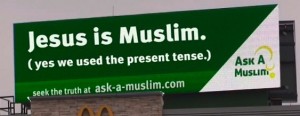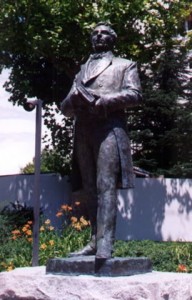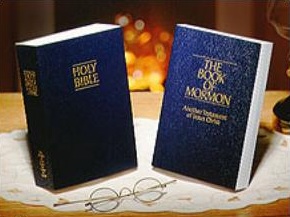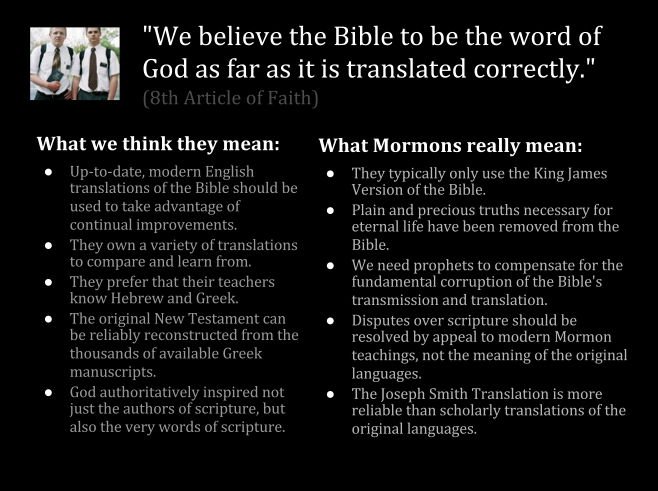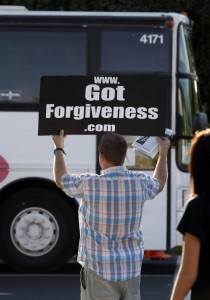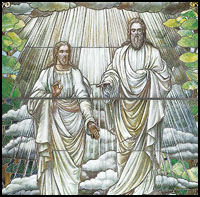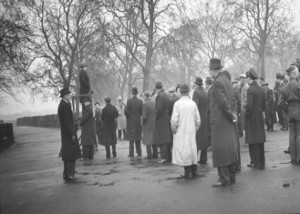Mormon blogger Jana Riess writes about “selective obedience” in her April 7th (2014) blog. She’s responding to a comment made by LDS apostle Robert Hales at last weekend’s General Conference. In his address, Mr. Hales contrasted three types of behavior: disobedience (rejection of God’s law), selective obedience, and mature Christ-like obedience. As reported by Deseret News, Mr. Hales said,
“At times members may participate in ‘selective obedience,’ claiming to love God and honor God while picking and choosing which of His commandments and teachings— and the teachings and counsel of His prophets — we will fully follow.”
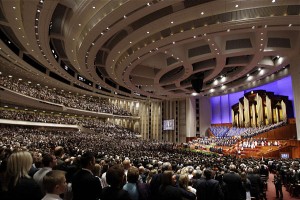 In her blog, Ms. Riess takes issue with Mr. Hales’ teaching, noting that “selective obedience is where most of us live. Of course we pick and choose. Of course we have to pray and make decisions.”
In her blog, Ms. Riess takes issue with Mr. Hales’ teaching, noting that “selective obedience is where most of us live. Of course we pick and choose. Of course we have to pray and make decisions.”
Ms. Riess contrasts her chosen “selective obedience” with those who take an all-or-nothing approach to LDS “prophetic authority.” There are those who believe “every statement that proceeds from a church leader’s mouth is gospel,” and there are those who “witness the overwhelming evidence of historical change in the Mormon tradition and conclude that little or nothing in the religion can be inspired.”
Ms. Riess recognizes that historical evidence exists that demonstrates past Church leaders have been wrong on occasion:
“that God denounced interracial marriage, for example, or that African-Americans would never be worthy to hold the priesthood by divine decree. Brigham Young taught that polygamy was an essential practice to prepare a person for life in the Celestial Kingdom (though some of his other statements qualified this). He also believed that there might be a Loch Ness-style monster living in the Bear Lake, which traveled via an underground tunnel to its other home in the Great Salt Lake.
“Clearly, none of this is current LDS teaching.
“So I’m not on board with the idea that I should simply accept anything proposed in General Conference, even if it is reiterated at different times by different general authorities…”
Yet Ms. Riess is not “ready to dismiss the many beautiful, true, and thought-provoking things that were said at General Conference” and therefore takes a middle-of-the-road approach. She chooses which “prophetic” teachings she will accept, and which she will dismiss.
In some ways, this reminds me of C.S. Lewis’ famous trilemma, expressed in his book Mere Christianity:
“I am trying here to prevent anyone saying the really foolish thing that people often say about Him: I’m ready to accept Jesus as a great moral teacher, but I don’t accept his claim to be God. That is the one thing we must not say. A man who was merely a man and said the sort of things Jesus said would not be a great moral teacher. He would either be a lunatic — on the level with the man who says he is a poached egg — or else he would be the Devil of Hell. You must make your choice. Either this man was, and is, the Son of God, or else a madman or something worse. You can shut him up for a fool, you can spit at him and kill him as a demon or you can fall at his feet and call him Lord and God, but let us not come with any patronising nonsense about his being a great human teacher. He has not left that open to us. He did not intend to.”
Like Jesus in Lewis’ trilemma argument, Mormonism has not left open the option that Jana Riess prefers — that Mormon “prophetic authority” can go terribly wrong sometimes, but at other times should be embraced as “beautiful, true and thought-provoking.”
This self-same “prophetic authority” has decisively pronounced the all-or-nothing argument that Ms. Riess rejects.
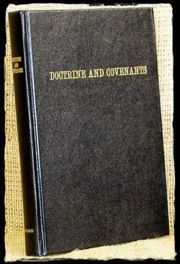 Mormon Scripture says of Mormon elders:
Mormon Scripture says of Mormon elders:
“And whatsoever they shall speak when moved upon by the Holy Ghost shall be scripture, shall be the will of the Lord, shall be the mind of the Lord, shall be the word of the Lord, shall be the voice of the Lord, and the power of God unto salvation. Behold, this is the promise of the Lord unto you, O ye my servants.” (D&C 68:4-5)
Mormon Scripture says of Joseph Smith (and by extension, subsequent Mormon prophets):
“thou shalt give heed unto all his words and commandments which he shall give unto you as he receiveth them, walking in all holiness before me; For his word ye shall receive, as if from mine own mouth, in all patience and faith.” (D&C 21:4-5)
The Mormon manual Gospel Principles explains Mormon Scripture:
“A prophet is a man called by God to be His representative on earth. When a prophet speaks for God, it is as if God were speaking (see D&C 1:38).”
If Mormons leaders holding “prophetic authority” speak for an omniscient God, then they cannot be wrong when speaking on spiritual matters. They cannot lead the Church astray with false doctrine. If they do, they are not speaking for God. Those holding “prophetic authority,” in their roles as prophets, seers and revelators, have taught:
“I say to Israel, the Lord will never permit me or any other man who stands as President of this Church to lead you astray. It is not in the program. It is not in the mind of God.” (Discourses of Wilford Woodruff, 212-213)
“We are most fortunate to have a living prophet at the head of the Church to guide us, and all who heed his counsel will be partakers of the promised blessings which will not be enjoyed by those who fail to accept his messages…Whose side are we on? When the prophet speaks the debate is over.” (N. Eldon Tanner [First Counselor in the First Presidency], “The Debate is Over,” Ensign, August 1979, 2)
“One cannot successfully attack true principles or doctrine, because they are eternal. The revelations that came through the Prophet Joseph Smith are still correct! …when you pick up a stick you pick up both ends. And so it is with the gospel. As members of the Church we need to accept all of it.” (James E. Faust, “Lord, I Believe; Help Thou Mine Unbelief,” Ensign, November 2003, 21-22)
Early Mormon apostle Orson Pratt proffered:
“If one portion of the doctrines of the Church is true, the whole of them are true. If the doctrine of polygamy, as revealed to the Latter-day Saints, is not true, I would not give a fig for all your other revelations that came through Joseph Smith the Prophet; I would renounce the whole of them, because it is utterly impossible, according to the revelations that are contained in these books, to believe a part of them to be divine—from God—and part of them to be from the devil; that is foolishness in the extreme…” (Orson Pratt, Journal of Discourses 17:224)
As much as Jana Riess and other liberal Latter-day Saints would like to approach Mormon “prophetic authority” as one might approach a dinner buffet, Mormonism does not give them that option. President James Faust did not allow for that kind of thinking:
“Revelations from the prophets of God are not like offerings at the cafeteria, some to be selected and others disregarded.” (ibid., Ensign, November 2003, 22)
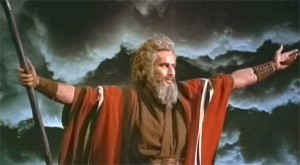 Mormons cannot have their cake and eat it, too. Either the prophets speak for God and what they teach is true, or they do not speak for God at all. Mormonism leaves no room for any conclusion other than (to borrow from C. S. Lewis),
Mormons cannot have their cake and eat it, too. Either the prophets speak for God and what they teach is true, or they do not speak for God at all. Mormonism leaves no room for any conclusion other than (to borrow from C. S. Lewis),
“A man who was merely a man and said the sort of things the Mormon prophet(s) said would not be a great moral teacher. He would either be a lunatic — on the level with the man who says he is a poached egg — or else he would be the Devil of Hell. You must make your choice. Either what this man spoke, and speaks, is ‘the will…mind…word…voice of the Lord, and the power of God unto salvation,’ or else he is a madman or something worse.”
And if the Mormon Church is led by a “madman,” if what its prophets, seers and revelators say are lies or delusions, then the Mormon Church is a fraud and the eternal promises it makes are null and void. Prophet Gordon B. Hinckley insisted,
“Each of us has to face the matter – either the Church is true, or it is a fraud. There is no middle ground. It is the Church and kingdom of God, or it is nothing.” (“Loyalty,” Ensign, May, 2003, 60).
Dear Mormons, it is “foolishness in the extreme” to believe that a true prophet, whose very words are “scripture,” would teach false doctrine (“whatever comes from the voices of those who hold that authority is scripture, no matter of what they may speak,” J. Reuben Clark, Jr. [First Counselor in the First Presidency], Conference Reports, April 1944, 112).
In truth it is all-or-nothing. The Mormon Church is the kingdom of God…or nothing. The conclusion is inescapable: The Church of Jesus Christ of Latter-day Saints, by its own definition, is nothing.
But do not lose hope my friends, for here…here is something. Here is our nothing covered by God’s all.


